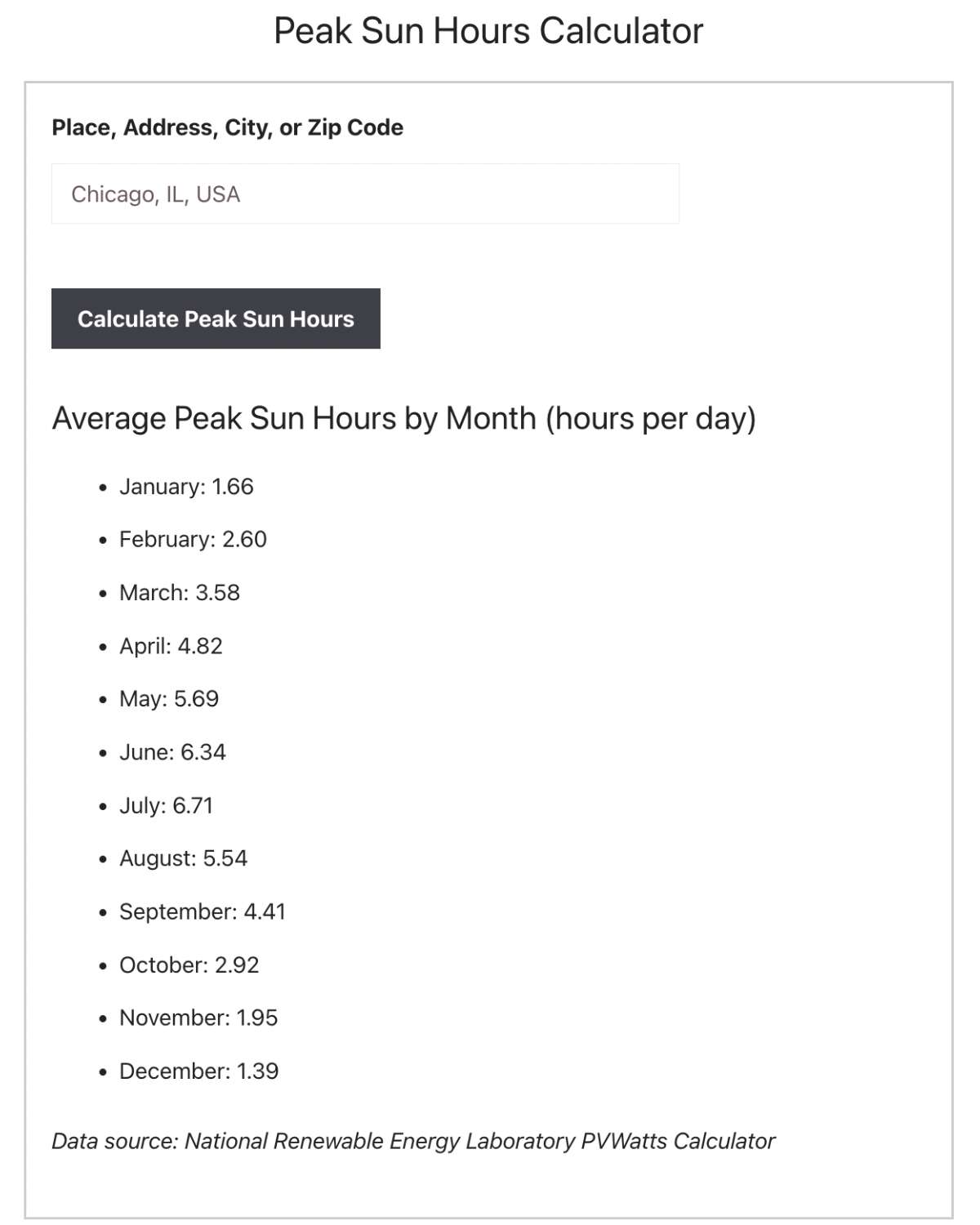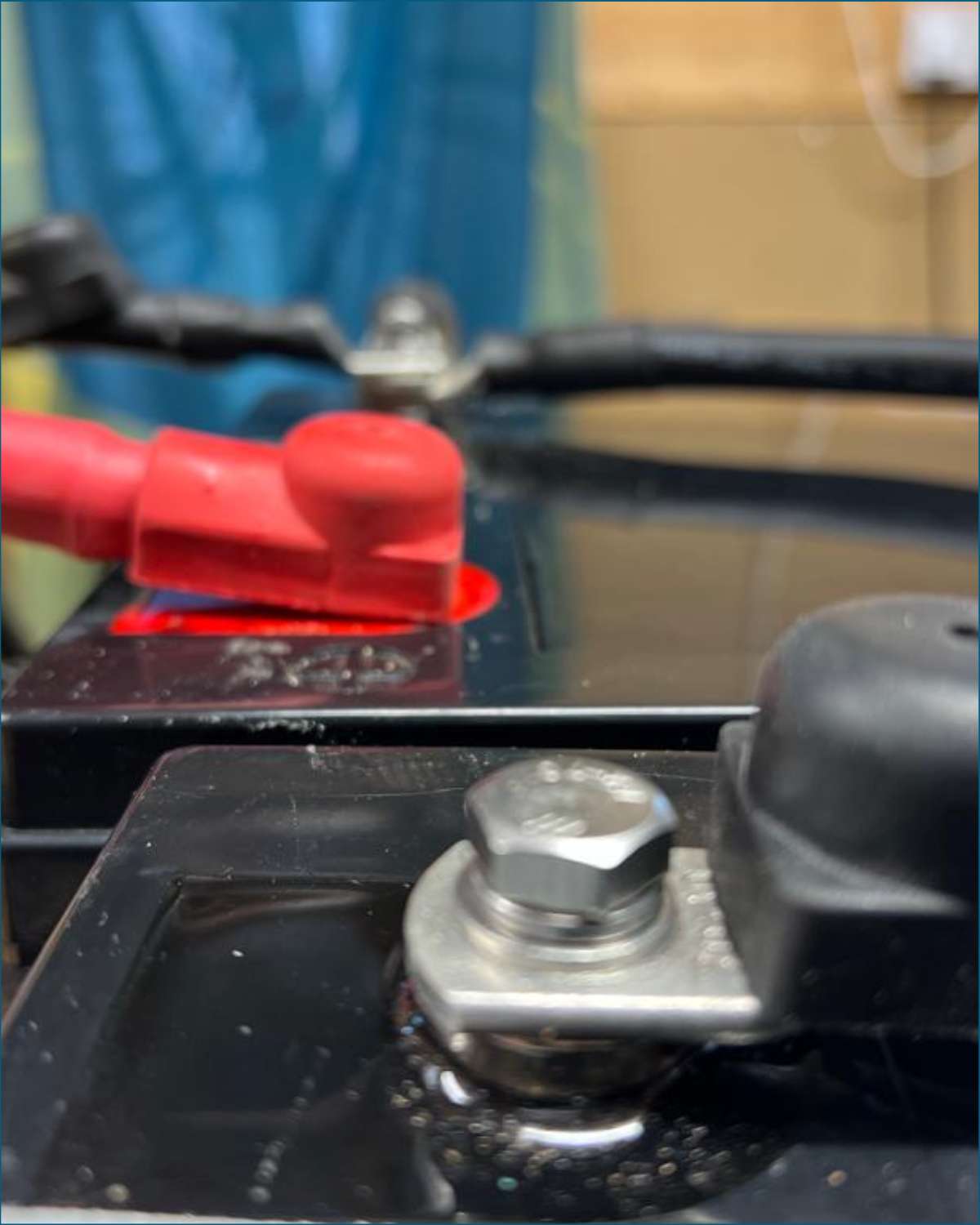Answering your query: Should I disconnect my RV battery when plugged in? Read on for the answers.
As an RV owner, you’ve probably wondered, “Should I disconnect my RV battery when plugged in?” when connected to shore power.
It’s a common dilemma that could impact your battery’s longevity.
In this post, we’ll explore the best practices for managing your RV battery’s health and provide valuable insights to help you decide when to disconnect your battery.
- Understanding RV electrical systems is key to properly disconnecting your battery.
- Weigh the pros and cons before deciding whether or not to disconnect your RV battery when plugged in.
- Alternative charging methods like Rv solar panels can help maintain optimal battery health and performance.
So let’s dive in!
Understanding RV Electrical Systems: AC and DC Power
To fully comprehend the issue of disconnecting your RV battery, it’s essential first to understand the two different electrical systems in an RV:
- AC (alternating current), and
- DC (direct current) power.
These separate systems serve different purposes and power various appliances within your RV.
The Role of DC Power
DC power is crucial for running specific functions and appliances in your RV, such as lights, slideouts, water pumps, and some appliances.
This power primarily comes from the RV battery.
If you switch on the battery disconnect, anything wired solely to the 12-volt system won’t work, even if you plug into 120-volt power.
Most converters feature a USB port, so arguably, you could use that to power one or two DC appliances.
In reality, converters are usually located in a place that would make that inconvenient.
So, if you need to charge the battery, you must keep it connected while you’re plugged in.
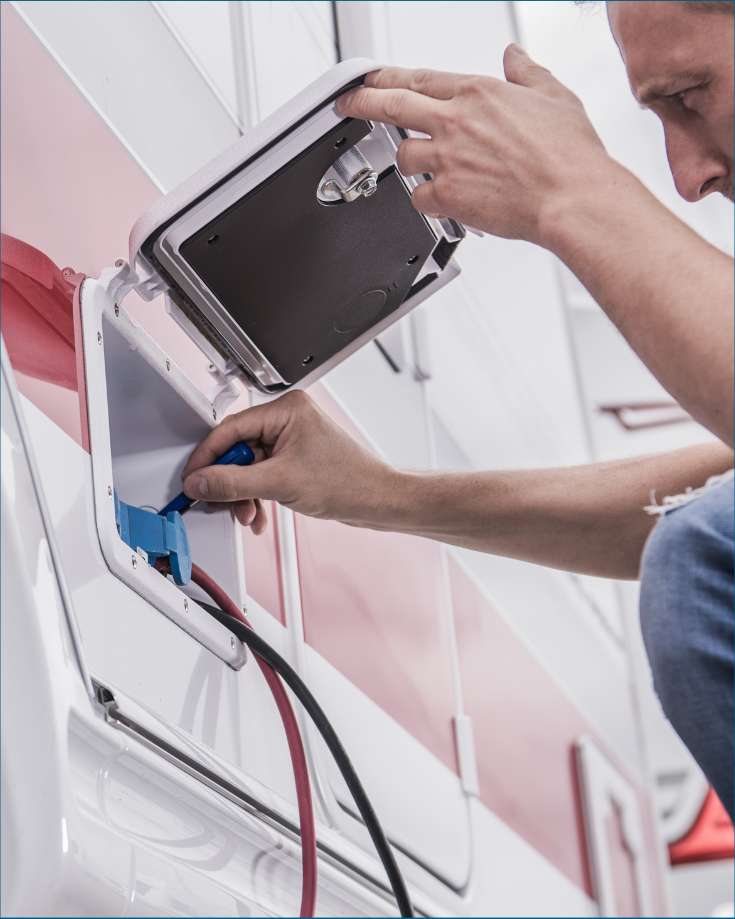
The Role of AC Power
In contrast to DC power, AC power comes from wall outlets and powers most consumer electronics.
AC power is also supplied to your RV through a shore power connection and/or an RV generator. That allows you to use appliances like the microwave, air conditioner, and 120V outlets that require more power.
A reliable power supply is essential to ensure these appliances’ stable and continuous operation.
Generally, the grid-supplied shore power is a stable energy supply.
Plugging into shore power can also charge the house battery inside your camper. You’ll need a battery charger or converter to keep the battery bank fully charged.
Disconnecting from shore power without a fully charged battery can create problems when you’re unplugged.
Attempting to use onboard lights and running the furnace may only be possible if the battery has sufficient power.
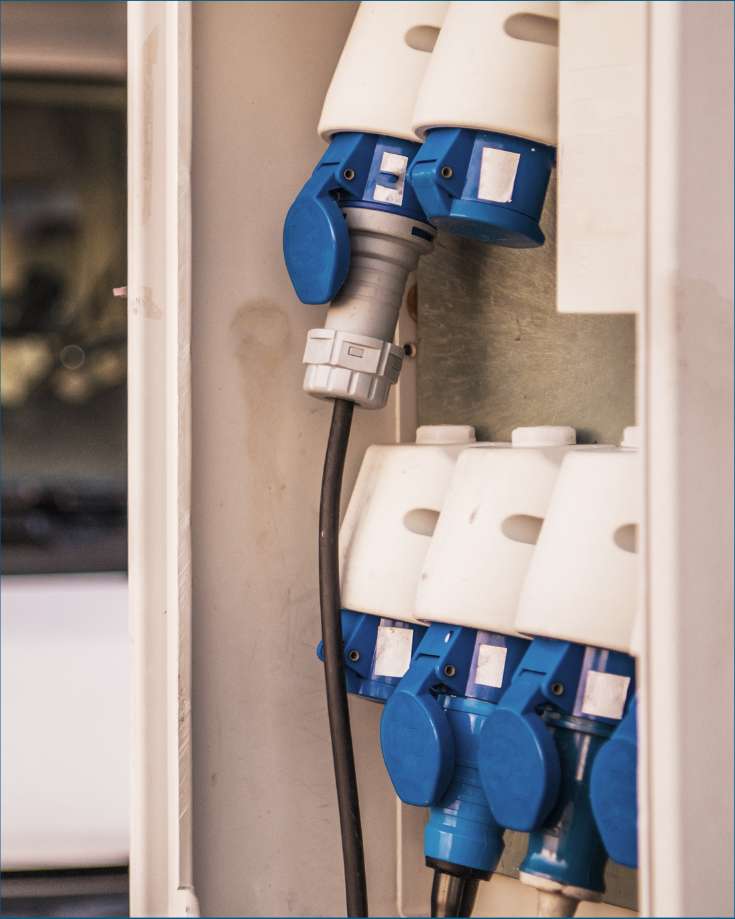
The Purpose & Function of an RV Converter
RV converters play a crucial role in your RV’s electrical system.
They convert 120V AC power to 12V or sometimes 24v DC power, allowing you to:
- use 12V/24v appliances with 120V AC power, and
- recharge your RV batteries when connected to shore power.
A converter turns AC power into DC power to charge up RV batteries and supply power to DC devices.
AC and DC Setups in an RV
Recreational vehicles (RVs) often utilize both alternating current (AC) and direct current (DC) power sources to provide electricity for various systems and appliances.
There are several different setups for using AC and DC in an RV, each offering its benefits and functionalities.
AC Only to Charge the Battery through a Converter
In this setup, the RV only uses AC power to charge the battery via a converter.
The converter is a device that changes the AC power from a shore power connection or generator into DC power, which is then used to charge the RV’s battery.
This setup is simple and cost-effective, but it also means that the RV’s electrical system depends entirely on the battery’s DC power.
Any AC power demands are met through an inverter powered by the battery bank.
This method may use more energy because changing AC to DC and then back to AC can cause energy loss.
But this way, even if there’s a power outage or you switch between the grid and a generator, your onboard AC services won’t be interrupted.
This is especially crucial if you need a constant AC supply for essential things like medical equipment or computer systems.
When disconnected from an AC power source, the RV will rely solely on the battery bank.
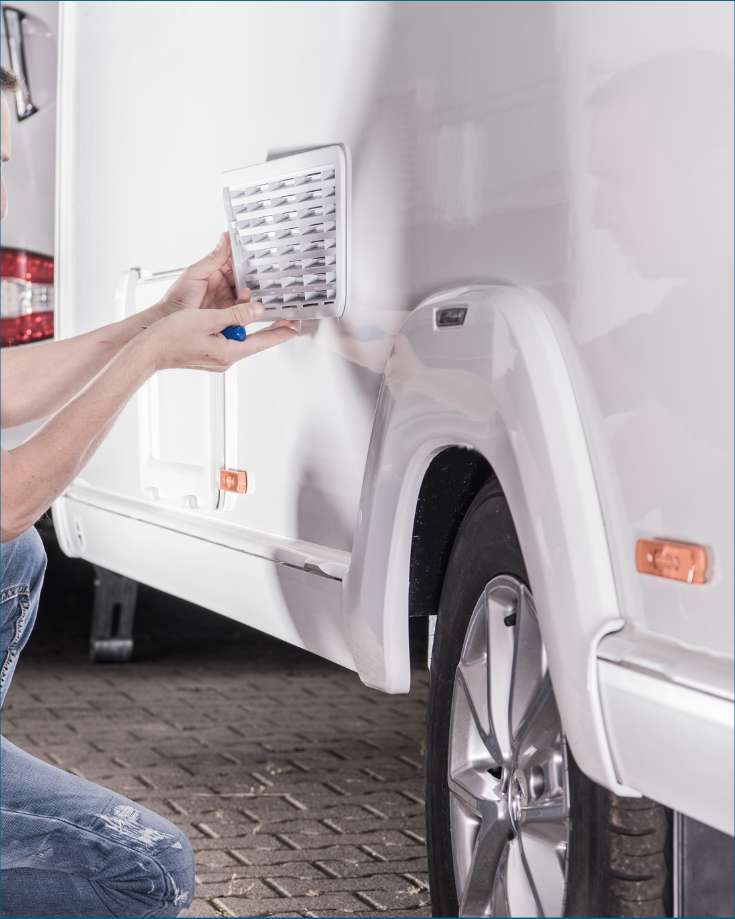
Charging the Battery through a Converter and Using AC to Power Separate AC Circuits
Another typical setup involves charging the RV’s battery through a converter and using AC power to supply separate AC circuits within the RV.
This configuration allows you to run appliances and devices that require AC power directly from the shore power connection or generator.
Some examples of these appliances include air conditioners, microwaves, and televisions.
In this setup, the battery is still charged via the converter, but the RV can also use AC power for specific needs.
Since air conditioners and heaters consume much power, many large RVs and 5th Wheels prefer this method.
Additionally, some campsites provide bigger 50A power supply points.
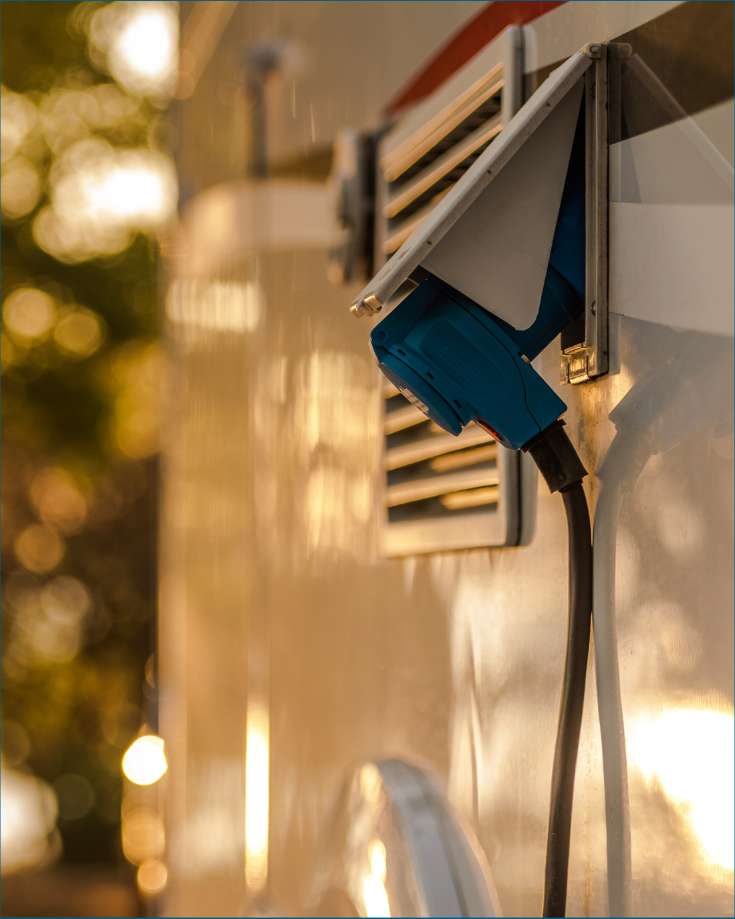
RVs with Transfer Switches
Some RVs come equipped with auto transfer switches that automatically detect when AC power is unplugged and switch to using inverted DC power from the battery to keep supplying the AC systems.
On an RV, that function is usually a feature of its inverter charger.
Some inverter chargers have an auto-start function for an installed generator.
In this scenario, if shore power is unplugged, the generator automatically starts and changes over the AC supply once it is up and running.
The feature offers convenience and pretty much seamless operation. It ensures your RV’s AC electrical system continues functioning even when disconnected from an external AC power source.
Transfer switches can be manual or automatic, which is more common in modern RVs.
These switches are handy for RV owners who frequently switch between shore, generator, and battery power, as they help maintain a continuous supply of electricity without any manual intervention.
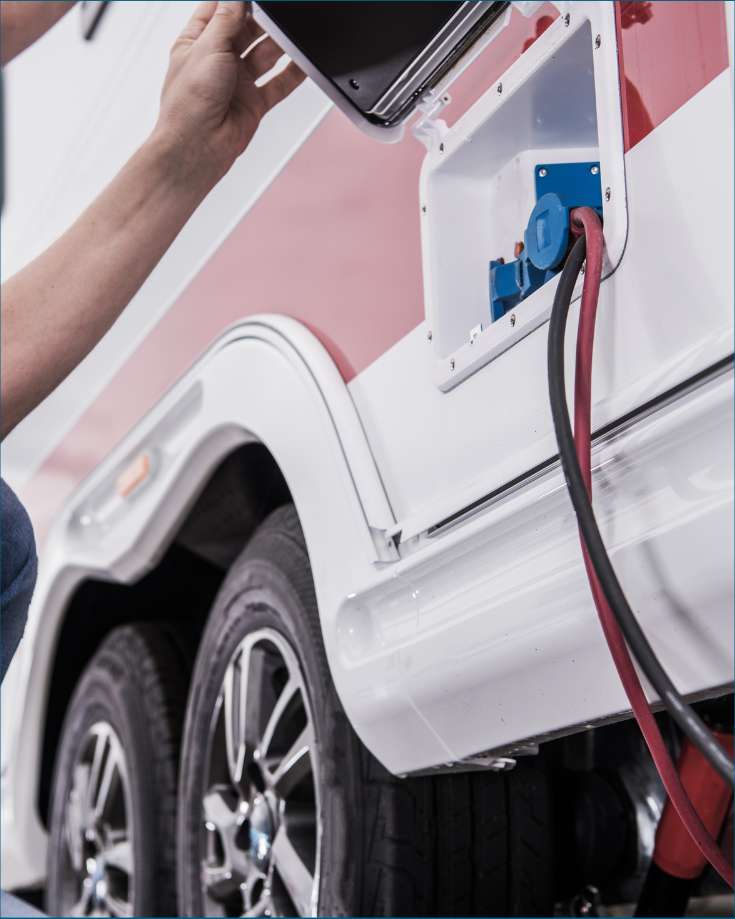
Disconnecting Your RV Battery: Pros and Cons
Now that we’ve covered the basics of RV electrical systems and the role of converters, let’s weigh the pros and cons of disconnecting your RV battery when plugged in.
Pros
Disconnecting an RV battery when plugged into shore power can offer several advantages:
- Prevent Overcharging: Disconnecting the battery while connected to shore power can help prevent overcharging, which may lead to reduced battery life or even damage the battery. Some RVs have built-in converters not equipped with a multi-stage charging system, which could result in overcharging the battery if left connected for extended periods.
- Extend Battery Life: You can prolong its lifespan by disconnecting the battery when using shore power. Batteries naturally degrade over time, and reducing the number of unnecessary charge cycles can help maintain their capacity and performance.
- Safety: Disconnecting the battery can eliminate the risk of electrical shorts or other issues arising from faulty wiring or connections. This can help ensure your RV’s and its occupants’ safety while connected to shore power.
- Power Surge Protection: In the event of a power surge or fluctuation at the shore power source, disconnecting the battery can protect it from potential damage. Power surges can cause significant harm to electrical components, including batteries.
- Reduced Parasitic Loads: Some RV appliances or devices may draw a small amount of power even when turned off, known as parasitic loads. Disconnecting the battery can eliminate these loads and prevent unnecessary energy consumption.
However, it’s important to note that modern RVs often come equipped with advanced converters or chargers with built-in protections like multi-stage charging, preventing most of these issues.
Always consult your RV owner’s manual or a professional before disconnecting the battery to ensure it’s the right decision for your specific setup.
Cons
Disconnecting an RV battery when plugged into shore power may also have some disadvantages, depending on your RV setup and specific needs:
- Loss of Backup Power: When the battery is disconnected, you lose the ability to use it as a backup power source in case of a shore power outage or disconnection. This means that any appliances or devices relying on DC power from the battery will not function during such events.
- Inability to Charge the Battery: Disconnecting the battery while on shore power prevents it from being charged by the converter. If you plan to use the battery later for boondocking or dry camping, you should reconnect it to charge before leaving the shore power site.
- Inconvenience: Depending on your RV’s battery location and accessibility, disconnecting and reconnecting the battery each time you plug into shore power can be inconvenient.
- Loss of DC-Powered Devices: Some RV systems or devices, such as certain lights, water pumps, or propane detectors, rely on DC power from the battery. Disconnecting the battery may render these devices inoperable, potentially affecting your comfort and safety.
- Advanced Converter/Charger Limitations: If your RV is equipped with a modern, multi-stage converter/charger, disconnecting the battery may not provide any significant benefits. These advanced systems are designed to manage charging efficiently and prevent overcharging, making disconnecting the battery in most cases unnecessary.
Before disconnecting your RV battery when plugged into shore power, consider your specific needs, RV setup, and potential drawbacks.
Consult your owner’s manual or a professional for the best practices for your RV’s electrical system.
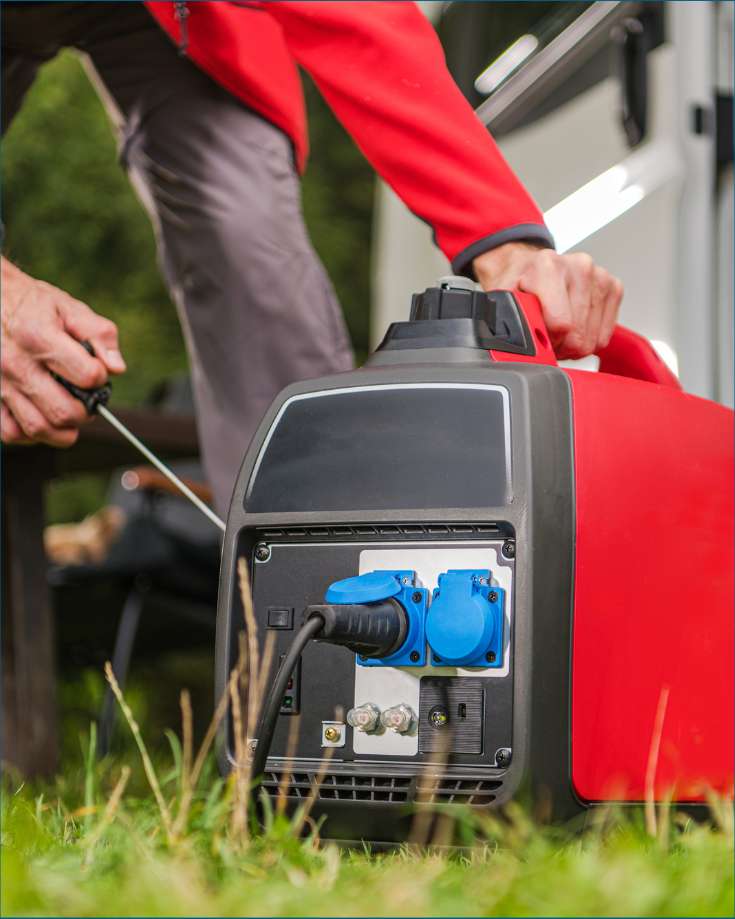
Utilizing a Battery Disconnect Switch
A battery disconnect switch simplifies disconnecting the RV battery, providing easy control over the battery’s connection to the electrical system.
Locating the Battery Disconnect Switch
The location of the battery disconnect switch varies depending on the RV type and model, but it is usually close to the battery or inside the battery compartment.
You’ll likely find the battery disconnect switch near other power panel components or a cabinet or wall near the battery compartment.
If you’re having trouble finding the battery disconnect switch in your RV, don’t worry!
Installing one is super easy, and the kits are very affordable.
Just make sure to plan the controller’s location ahead of time to ensure you have all the parts needed to get the job done.
Installing a Battery Disconnect Switch
Installing a battery disconnect switch can be a DIY project, but hiring a professional mechanic is recommended for safety and proper installation.
If you’re adept at RV electrics, you can follow our step-by-step how to install an RV battery disconnect switch here.
Alternative Charging Methods for Your RV Battery
Apart from using a battery disconnect switch, there are alternative charging methods to maintain your RV battery’s health, especially for older models or during long-term storage.
These methods include using a generator, a converter, solar panels, or a plug-in charger.
External chargers, for example, are convenient and can be plugged into any regular outlet.
Solar panels are another excellent option for charging your RV battery and connecting to a battery bank.
They’re easy to install and provide a consistent power source for your battery.
Whichever alternative charging method you choose, it’s crucial to ensure it’s compatible with your RV’s electrical system and well-maintained for optimal performance.
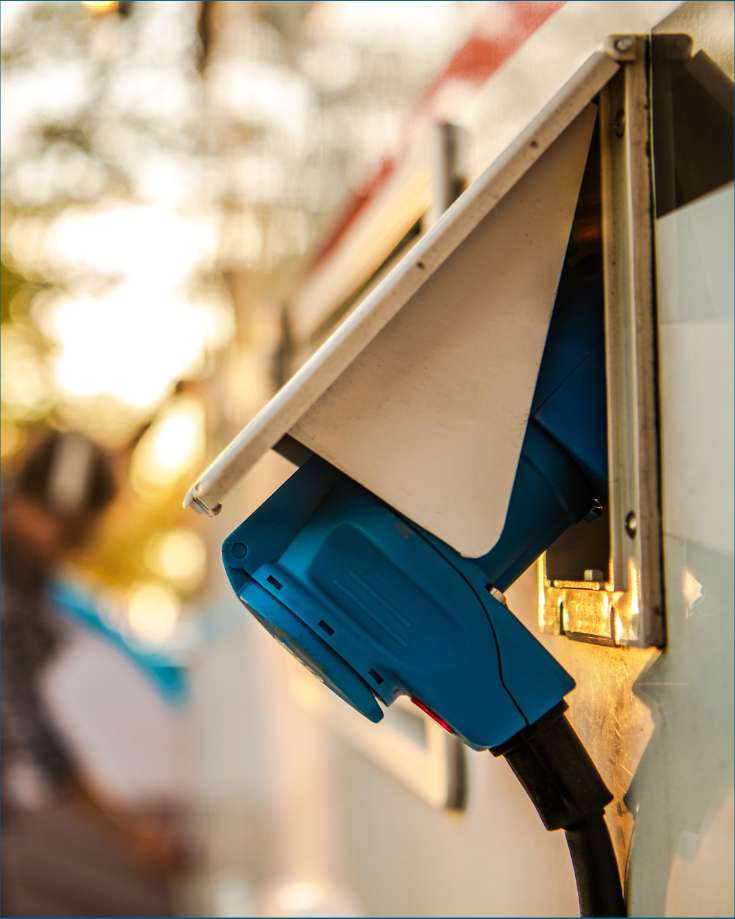
When to Disconnect Your RV Battery: Scenarios and Recommendations
Knowing when to disconnect your RV battery can be crucial for its longevity and performance.
Whether you’re storing your RV or actively using it, understanding the right scenarios and recommendations for disconnecting your battery can save energy and extend the battery life.
Here are a few examples of when to disconnect your RV battery.
- During Storage: If you’re storing your RV for an extended period, it’s advisable to disconnect the battery. This prevents the battery from draining due to parasitic loads.
- In Winter Storage: Cold temperatures can be hard on batteries. Disconnecting and removing your RV battery in winter can help extend its lifespan.
- Maintenance and Cleaning: Always disconnect the battery before performing any maintenance or cleaning to ensure safety from electric shocks.
- Replacing the Battery: When swapping out an old battery for a new one, always disconnect the current battery first to avoid short circuits.
- Troubleshooting Electrical Issues: If you’re experiencing electrical problems in your RV, disconnecting the battery can be a good first step in diagnosing the issue.
And here are a few examples of when disconnecting your RV battery is unnecessary:
- While Driving: If your RV is fitted with a B2B or DC to DC charger, you need to leave your battery connected while you drive to receive a charge.It is more electrically safe under these circumstances to leave it connected than disconnected.
- During Short Breaks: If you’re just taking a short break from your journey for a night or two, there’s no need to disconnect the battery.
- When Using Solar Panels: If you use solar panels to charge your RV battery, keep it connected to ensure it receives the charge.
- Running Appliances: If you’re using appliances that are powered by the RV battery, don’t disconnect it. This includes your fridge, HVAC system, and more.
- Using the RV Alarm System: If your RV has an alarm system powered by the RV battery, keep it connected for security purposes.
In Conclusion
Learning about your RV’s electrical systems, what converters do, and the advantages and drawbacks of unplugging your RV battery is key to managing it well.
Taking good care of your RV battery is important for making it last longer and keeping your vehicle running smoothly.
It’s helpful to know when to unplug your RV battery, like when it’s in storage or being serviced, to maintain its lifespan and stop it from wasting energy.
On the other hand, knowing when to keep it connected, such as when you’re driving or using appliances, makes sure your RV works properly.
The key is to balance the needs of your specific situation with the best practices for RV battery care.
When in doubt, always refer to your RV’s manual or consult a professional. By doing so, you’ll ensure a seamless journey on the road, powered by a well-maintained RV battery.
Happy travels!
Graham Bogie

Graham is a seasoned marine electrical engineer with two decades of experience designing customized electrical systems for plant machinery and converting campers and overland vehicles. His expertise has led him to author the reputable Campervan Electrics Handbook and become the chief designer of the RV Wiring Design Tool. As a knowledgeable figure in the field, his YouTube channel, blog, Facebook group, and newsletter, offering electrical advice and product reviews, reach more than a million users each year.

